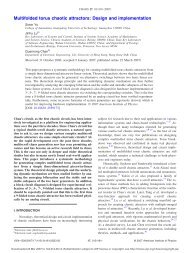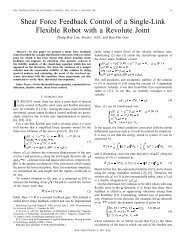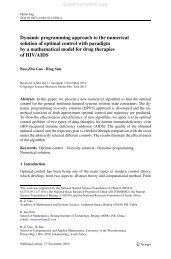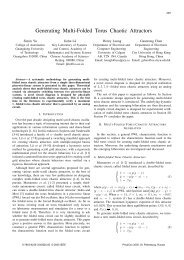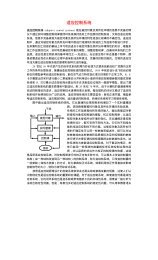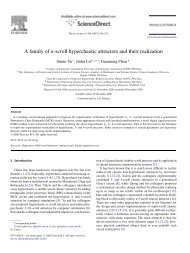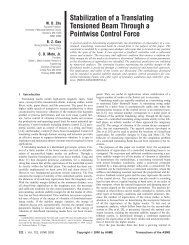Conference Program of WCICA 2012
Conference Program of WCICA 2012
Conference Program of WCICA 2012
You also want an ePaper? Increase the reach of your titles
YUMPU automatically turns print PDFs into web optimized ePapers that Google loves.
<strong>Conference</strong> <strong>Program</strong> <strong>WCICA</strong> <strong>2012</strong><br />
Gui, Weihua<br />
Central South Univ.<br />
Sun, Xue<br />
Nanjing Normal Univ.<br />
This paper investigates parametric stability <strong>of</strong> nonlinear systems with<br />
uncertain parameters based on decentralized control. The main concern<br />
is that the equilibrium <strong>of</strong> the closed-loop system drifts with the<br />
change <strong>of</strong> the parameters. First, the impact <strong>of</strong> the parameters on the<br />
equilibrium location is investigated. Then, a decentralized linear controller<br />
is designed to make the closed-loop system parametrically stable.<br />
The proposed method combines different optimization techniques<br />
to produce a robust control that accounts for uncertain parametric variations,<br />
and the corresponding equilibrium shifts. Finally, simulation results<br />
are given to show the effectiveness <strong>of</strong> the proposed method.<br />
SuA02 13:30–15:30 Room 203B<br />
Multi-Agent Systems (I)<br />
Chair: Cai, Yunze<br />
Co-Chair: Zhang, Zhenning<br />
Shanghai Jiao Tong Univ.<br />
Chinese Acad. <strong>of</strong> Sci.<br />
◮ SuA02-1 13:30–13:50<br />
Multi-agent Competitive Control Systems, pp.2263–2267<br />
Zhang, Zhenning<br />
Cheng, Daizhan<br />
Chinese Acad. <strong>of</strong> Sci.<br />
Chinese Acad. <strong>of</strong> Sci.<br />
In this paper, we consider the multi-agent competitive control systems<br />
with varying adjacent topology. The dynamics and the performance<br />
<strong>of</strong> each agent <strong>of</strong> the multi-agent system depend on both itself and its<br />
neighborhood. The optimal solutions are the Nash equilibriums, which<br />
are determined by coupled Hamilton-Jacobi-Bellman equations. We<br />
mainly concern with continuous-time affine nonlinear systems and linear<br />
systems. Finally, a two-agent linear control system is used to illustrate<br />
our results, where the two agents are related through a periodic<br />
switching.<br />
◮ SuA02-2 13:50–14:10<br />
Flocking <strong>of</strong> Multi-Agents Based on Consensus Protocol and Pinning<br />
Control, pp.1311–1316<br />
He, Chenlong<br />
Feng, Zuren<br />
Ren, Zhigang<br />
Xi’an Jiaotong Univ.<br />
Xi’an Jiaotong Univ.<br />
Xi’an Jiaotong Univ.<br />
In this paper we propose three controllers for flocking <strong>of</strong> multi-agent system,<br />
which are basic linear controller, controller with actuator saturation<br />
and controller with time delay under the condition that the information<br />
exchanging topology <strong>of</strong> agents is connected and fixed. Each controller<br />
is composed <strong>of</strong> two components as consensus algorithms for making<br />
the entire agents converge to a common state and pinning control for<br />
guiding the agents to the desired moving direction. The stability <strong>of</strong> controllers<br />
is analyzed and the effectiveness <strong>of</strong> controllers is demonstrated<br />
by numerical simulation.<br />
◮ SuA02-3 14:10–14:30<br />
Distributed Event-triggered Tracking Control <strong>of</strong> Multi-Agent Systems<br />
with Active Leader, pp.1453–1458<br />
Zhang, Yanqiong Acad. <strong>of</strong> Mathematics & Sys. Sci., Chinese<br />
Acad. <strong>of</strong> Sci.<br />
Hong, Yiguang<br />
Chinese Acad. <strong>of</strong> Sci.<br />
Event-triggered control is an effective protocol to design distributed control<br />
<strong>of</strong> multi-agent systems with the limited resources. In this paper, we<br />
consider a multi-agent tracking problem for a linear active leader based<br />
on event-triggered control. The state <strong>of</strong> the leader keeps changing and<br />
may not be measured. To estimate the state such a leader individually,<br />
a neighbor-based local controller together with a neighbor-based<br />
state-estimation rule is given for each autonomous agent, and the communication<br />
<strong>of</strong> the agents under consideration is event-driven. Then we<br />
prove that, with a constructed common Lyapunov function for switching<br />
topology, each agent can track the active leader with unmeasurable<br />
states.<br />
◮ SuA02-4 14:30–14:50<br />
On Necessary and Sufficient Conditions <strong>of</strong> the Consensusabilityfor<br />
Second-order Discrete Multi-agent Systems, pp.1727–1732<br />
Zhu, Jiandong<br />
Nanjing Normal Univ.<br />
In this paper, necessary and sufficient conditions <strong>of</strong> the consensusability<br />
are obtained for second-order discrete multi-agent systems without<br />
assuming that all the eigenvalues <strong>of</strong> each agent’s dynamical equation<br />
lie on or outside the unit circle, which is a basic assumption in [1]. The<br />
obtained results show that, if each agent’s dynamical equation has a<br />
stable eigenvalue, the condition ∏︀ j |λu j<br />
(A)| < (1 + r)/(1 − r) obtained<br />
in [1] may not be necessary anymore, where λ u j<br />
(A) denotes<br />
each unstable eigenvalue <strong>of</strong> the coefficient matrix A <strong>of</strong> every agent and<br />
r the eigenratio <strong>of</strong> the graph. Consensus protocols are designed for<br />
some numerical examples that do not satisfy the above condition in [1].<br />
Moreover, using the proposed method in this paper, all the possible<br />
control gains can be designed constructively.<br />
◮ SuA02-5 14:50–15:10<br />
Distributed Filtering Basing Consensus for the Local Strongly Coupled<br />
Systems, pp.1801–1805<br />
Cai, Yunze<br />
Wang, Hua O.<br />
Xu, Xiaoming<br />
Shanghai Jiao Tong Univ.<br />
Boston Univ.<br />
Shanghai Jiao Tong Univesity;<br />
The interactions between subsystems are important for large-scale systems.<br />
We introduce a local strongly coupled system which coupled by<br />
random communication between subsystems. Due to the intermittent<br />
communication, it is difficult to apply the standard Kalman or robust filter<br />
to design procedures to such systems. In this paper, we addressed the<br />
distributed robust filter design method for this kind <strong>of</strong> system based on<br />
consensus idea. The main result is a sufficient condition which guarantees<br />
a suboptimal level <strong>of</strong> disagreement <strong>of</strong> estimates in a coupled<br />
network <strong>of</strong> estimators. The condition is formulated in terms <strong>of</strong> feasibility<br />
<strong>of</strong> biaffine matrix inequalities (BMIs). The generic algorithm is<br />
used to treat the bilinear relation between filter parameters and the interconnection<br />
gains. The proposed approach is applied to the problem<br />
<strong>of</strong> formation-based robust synchronization. The numerical simulations<br />
show the effectiveness <strong>of</strong> the proposed filtering method.<br />
◮ SuA02-6 15:10–15:30<br />
Decentralized Sweep Algorithm <strong>of</strong> Multi-agent Systems with Adaptive<br />
Workload Assignment, pp.4320–4325<br />
Zhai, Chao<br />
Hong, Yiguang<br />
Chinese Acad. <strong>of</strong> Sci.<br />
Chinese Acad. <strong>of</strong> Sci.<br />
This paper discusses decentralized sweep coverage <strong>of</strong> a given region<br />
with parametric uncertainties by multiple agents. With parametric uncertainty<br />
in the environment, we present an adaptive sweep coverage<br />
algorithm to guarantee the region coverage by sweeping and workload<br />
partition. The adaptive technique with persistence condition is employed<br />
to sweep an unbounded region, and the upper bound for the<br />
extra time spent due to the environmental uncertainty is estimated for<br />
the covered region.<br />
SuA03 13:30–15:30 Room 203C<br />
Image Processing<br />
Chair: Yang, Wankou<br />
Co-Chair: Yu, Xiao<br />
Southeast Univ.<br />
Univ. <strong>of</strong> Sci. & Tech. Beijing<br />
◮ SuA03-1 13:30–13:50<br />
Compression <strong>of</strong> MR-Thermometry Images Using Reduced-Order<br />
Karhunen-Lo‘eve Basis, pp.4655–4660<br />
Niu, Ran<br />
GE Global Research (Shanghai)<br />
In this paper, we develop an approach to achieve MR thermal image<br />
compression by exploiting the spatial correlations <strong>of</strong> image voxels during<br />
thermal treatment. A set <strong>of</strong> reduced-order basis was identified using<br />
Karhunen-Lo‘eve (KL) decomposition <strong>of</strong> MR thermal images. Each<br />
image can be compressed with a relative small number <strong>of</strong> identified<br />
KL basis functions. The proposed approach can be used in real-time<br />
compression <strong>of</strong> imaging data in order to minimize a potentially massive<br />
amount <strong>of</strong> information that must be exchanged between the MR<br />
scanner and the treatment controller, and reduce computer storage requirements<br />
during thermal treatment. Simulation and MR thermometry<br />
experimental results demonstrate that the proposed image compres-<br />
206



